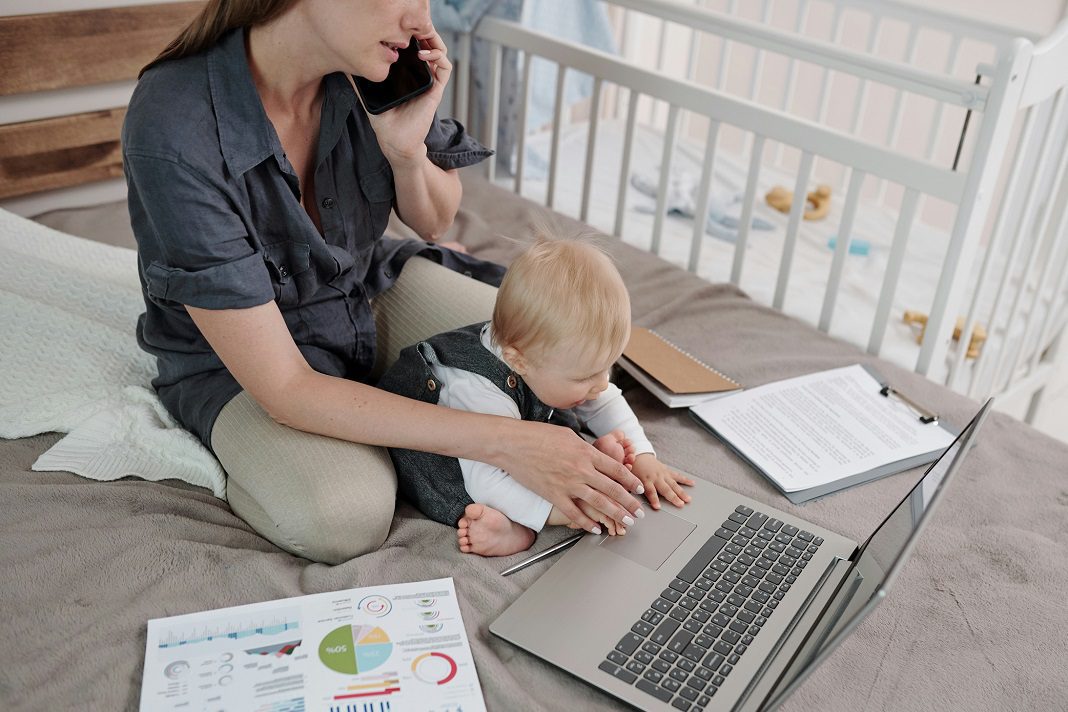by Elysia Hegarty, Future of Work Institute (Cpl Group), and President of Future Work.World Ireland
Hi, my name is Elysia and I’m a Working-Mom!
And sometimes I feel stuck. Not because I’m not capable or unsupported but because the rules I was taught about success no longer apply.
I’ve just returned from maternity leave and before I launch back into frameworks and future trends, I want to start with something more honest: Motherhood changed how I think and feel about the world of work. I know I’m not the first to say this or the first to feel it. There are a bunch of us out there and I’ve been speaking to a lot of people about it recently.
Motherhood has cracked open the essence of how I work, lead and live and revealed a world full of contradictions. They’re not personal, they’re systemic and they’re shaping the future of work whether we’re ready for it or not. In this article I will touch on some of these contradictions and follow up with a series going deeper into each one individually.
Contradiction 1: We champion flexibility but also feel the need to overperform to prove we’re still committed
There was a time when it was ok to ask a woman in an interview about her plans for motherhood because it was seen as a liability. Now, we celebrate flexible policies and parental leave but inside many of us are still gritting our teeth to prove our ambition hasn’t faded but it has been redefined.
I’m lucky to work in an organisation with flexibility that advocates for working parents, but there is still an internal obligation I place on myself to prove that having children doesn’t impact my job, when in reality, it does.
Leading with flexibility isn’t about fewer hours or easier projects, it’s about clearer intent. It’s about designing work in a way that adds value and makes space for life to sit in between it.
Contradiction 2: You have a seat at the table, but your child doesn’t have one at daycare
We’re told women should return to work, that we are needed at the table. That our leadership, voice and talent are vital. And yet, the very infrastructure that makes that possible – childcare – is either unaffordable, unavailable, or unsustainable. We celebrate women getting back to the workplace while quietly ignoring that many are sending (or scheduling) emails at 11pm after long days of caregiving.
I’m very lucky that my husband works opposite hours to me that we can share the caregiving, but it wasn’t the initial goal, it was a work around we needed to build in a system that wasn’t quite built for us.
You can’t level the playing field if the price of admission is privilege. This isn’t a parenthood penalty, it’s a societal mismatch. If we want women in leadership, we need to build systems and champion for systems that support their lives not just their work output.
Contradiction 3: Be present at home, but also always available at work
Right now, I am writing this article while watching the monitor hoping that baby sleeps enough for me to finish my train of thought. We’re urged to be mindful, present parents but also hyper-responsive team players. I’ve literally gone from singing “Itsy Bitsy Spider” to answering calls with seconds to spare. We praise presence but reward reactivity. We tell working moms to set boundaries, then get frustrated when they’re not available at 4:30pm.
Presence isn’t just about being somewhere physically it’s about cognitive capacity. And when we split our focus across 100 tabs, no one gets the best of us. The challenge isn’t in showing up, it’s in not splitting ourselves into so many pieces we forget who we are.
As leaders we must allow flexibility with empathy and create channels where open conversations can happen, and parents can feel unburdened with having to pretend to be always available. That’s true flexibility.
Contradiction 4: We say leadership needs empathy, but we omit lived experience
Post-pandemic, we hear it everywhere: “The future of leadership is empathy.” And yet, when a working mom says, “I need to shift that meeting because my baby’s sick,” or admits to exhaustion, the room goes silent. Empathy isn’t just a leadership buzzword; it’s a muscle we’re still learning how to use. It’s a skill that needs to be learned not a box that needs to be ticked.
As someone who designs leadership development programmes with organisations, I’ve seen firsthand how often their focus is on performance and not always empathy. We need to champion organisations that prioritise training for leading change as well as flexing the empathy muscle.
Being a mother has deepened my empathy as a consultant, a leader, and a human. But it’s also made me see how selective we are about which emotions are “professional”, and which are “personal.” If we want people to “bring their full self to work” and be leaders who show up with empathy, we need to stop treating parenthood as abnormal or that work and parenthood can’t co-exist or intertwine when they do. They must. The future of work won’t work if we allow parenthood to remain invisible.
Contradiction 5: You can “have it all,” but nobody asks if you even want it
“Having it all” has become the goal we quietly force feed women. Yes, you can have a career, a family, a social life, a fitness regime and an Insta-worthy home but maybe we don’t want it all. I’ve been burned out in the past, no thank you!
Mothers are the most burnt-out people on the planet. Not only are we expecting them to dual role, but we’re also setting higher expectations for them to continue to “have it all” as if it defines us and our success. Having it all is the new “hustle” wrapped up with a pink bow.
I am a feminist but since becoming a mother my definition of feminism has changed. Before I had kids, I thought that meant showing I could have (or do) it all. Maybe we just want what matters. And that’s different for everyone. True feminism is about choice. For some women, that’s climbing the ladder. For others, it’s stepping back. Neither makes you less valuable or less ambitious. The problem is when we frame every decision as a trade off when sometimes, it’s just a choice. Motherhood didn’t dull my ambition, it clarified it.
We need to stop expecting women to have it all and accept that creating value and impact is ambitious enough. Perhaps this will be how women soar in the workplace.
Conclusion
These contradictions don’t make me bitter; they simply make me more aware and more intentional. Perhaps, like other working parents it allows me to look at the messy, complex world of work with a very new lens.
Because these aren’t just contradictions for working moms or working parents, they’re the frontlines of the future of work. And in order for the future of work to thrive and evolve into a healthy place to be for us and our children we need to redefine what flexibility actually means, champion for better supports for caregiving, allow non-judgemental conversations to happen about the true realities of being a working parent, flex our empathy muscle and redefine success.
It’s time our leadership programmes reflected the complexity of modern life to acknowledge the pressures of dual roles, caregiving, neurodivergence, resilience and the blurred lines between personal and professional. We don’t just need empathy modules we need systems, cultures and rituals that reflect the evolving leader.
About the author
As Associate Director at the Future of Work Institute (Cpl Group), an award-winning consultancy and President of Future Work.World Ireland, Elysia helps leaders reimagine how people and organisations thrive together. With 20+ years’ experience across HR, wellness, and employee experience, she partners with organisations to design inclusive, human-centred strategies, diagnostics that uncover what really drives engagement, workshops and talks that spark change. She is passionate about designing work that works for neurodiverse leaders, working parents and the people behind the job title with wellness at its core.










